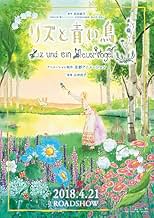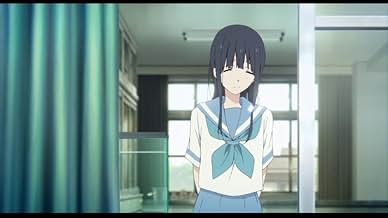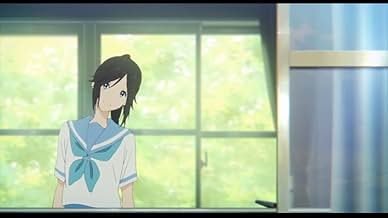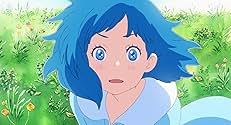IMDb RATING
7.2/10
2.8K
YOUR RATING
Best friends in their last year of high school realise there is no such thing as being together forever.Best friends in their last year of high school realise there is no such thing as being together forever.Best friends in their last year of high school realise there is no such thing as being together forever.
- Awards
- 1 win & 4 nominations total
Nao Tôyama
- Nozomi Kasaki
- (voice)
Miyu Honda
- Liz
- (voice)
Yuri Yamaoka
- Yuko Yoshikaw
- (voice)
Shiori Sugiura
- Ririka Kenzaki
- (voice)
Tomoyo Kurosawa
- Kumiko Oumae
- (voice)
Ayaka Asai
- Hazuki Katou
- (voice)
Moe Toyota
- Sapphire Kawashima
- (voice)
Chika Anzai
- Reina Kousaka
- (voice)
Takahiro Sakurai
- Noboru Taki
- (voice)
Ryan Bartley
- Ms. Niyama
- (English version)
- (voice)
Wayne Grayson
- Noboru Taki
- (English version)
- (voice)
Brittney Lee Hamilton
- Additional Voices
- (English version)
- (voice)
Megan Taylor Harvey
- Yuko Yoshikawa
- (English version)
- (voice)
- (as Megan Harvey)
Xanthe Huynh
- Ririka Kenzaki
- (English version)
- (voice)
- Director
- Writers
- All cast & crew
- Production, box office & more at IMDbPro
Featured reviews
That's all i gotta say it was a beautiful masterpiece, so simple. the art style, everything was so comforting and pleasing to the eye. the characters i loved everything
"Liz and the Bluebird," is a new film directed by Naoko Yamada for Kyoto Animation. If you were a fan of Sound Euphonium, you'll smile at all the Easter eggs delicately placed throughout the story. The movie is set in the same high school and in the same universe as Sound Euphonium, and features the same orchestra director/music teacher. But this time, Yamada tells a different story of these music students, weaving the real life relationship between two best friends and a special duet they are supposed to perform based on a folk tale entitled "Liz and the Bluebird."
Mizore and Nozomi are best friends. Mizore is very shy and withdrawn, always feeling lonely and lost, while Nozomi is an effervescent social butterfly. Nozomi seems to have it all: charm, wit, talent, personality. Even her ponytail swishes with an air of confidence as she walks. Mizore earnestly feels that she cannot exist without Nozomi around her. But these girls are now in their senior year in high school. It's time to think about graduation, college, and those hard decisions about everything that comes after. Although neither girl feels ready, it's time for them to grow up. All of this is plays out beautifully through the musical piece, "Liz and the Bluebird," a story about a young, lonely woman who befriends a magical girl in blue. Yamada uses an actual high school orchestra for the soundtrack, which makes the story so much more poignant as our main characters struggle through the piece and with their relationship to each other.
"Liz and the Bluebird" is a lovely little coming of age story. Yamada's genius lies in her ability to focus in and magnify that magical moment when a young person finally reaches that crest of self-actualization, when they see themselves as they truly are and how they impact those around them, as well as how much others impact them. Yamada seems to understand the true nature of friendship more than any other movie director. She also has a clear understanding of the role parents and teachers can play in a young person's life. While in A Silent Voice, it was the parents who had a strong impact, in Liz and the Bluebird, it's the teachers, Ms. Niyama, in particular, who gently guides the two girls in their journey of musical analysis and self-reflection.
If you just want a sweet movie that's a breath of fresh air, this is the one.
Mizore and Nozomi are best friends. Mizore is very shy and withdrawn, always feeling lonely and lost, while Nozomi is an effervescent social butterfly. Nozomi seems to have it all: charm, wit, talent, personality. Even her ponytail swishes with an air of confidence as she walks. Mizore earnestly feels that she cannot exist without Nozomi around her. But these girls are now in their senior year in high school. It's time to think about graduation, college, and those hard decisions about everything that comes after. Although neither girl feels ready, it's time for them to grow up. All of this is plays out beautifully through the musical piece, "Liz and the Bluebird," a story about a young, lonely woman who befriends a magical girl in blue. Yamada uses an actual high school orchestra for the soundtrack, which makes the story so much more poignant as our main characters struggle through the piece and with their relationship to each other.
"Liz and the Bluebird" is a lovely little coming of age story. Yamada's genius lies in her ability to focus in and magnify that magical moment when a young person finally reaches that crest of self-actualization, when they see themselves as they truly are and how they impact those around them, as well as how much others impact them. Yamada seems to understand the true nature of friendship more than any other movie director. She also has a clear understanding of the role parents and teachers can play in a young person's life. While in A Silent Voice, it was the parents who had a strong impact, in Liz and the Bluebird, it's the teachers, Ms. Niyama, in particular, who gently guides the two girls in their journey of musical analysis and self-reflection.
If you just want a sweet movie that's a breath of fresh air, this is the one.
10zak55
If you want a film that gives you tons of action, an incredibly complex story, or a dark tale, this isn't the movie for you. However, if you're in the mood for a stunning character piece that tells a simple but superb story than this is a movie for you. It tells it's story partially through the stunning body language displayed by the characters as while you might not hear what the characters are thinking all of the time, you can certainly gauge it from how they have their arms and legs positioned, expressions that briefly flash across their face, or how they are postured. Liz and The Blue Bird requires you to pay attention and it rewards you for doing so. It also uses music (It is a music anime) to give the most emotional moment of the movie that is soon followed by it's most enthralling part. The voice acting also carries the move to the next level as each actress gives an outstanding performance that gives further depth to their characters. You also don't really need to watch the series to get the characters as they were only side companions to the main story. But here, they take center stage and honestly surpass their predecessor in every regard. So yeah...go watch this movie.
Starting to watch this movie I had little idea of it being a spinoff of the vast world built by the anime show "Hibike! Euphonium" which I didn't know at this point. Although its animation style, pace and overall atmosphere is rather different I'm still grateful that it introduced me to this beautiful world.
Contrary to the show this movie is spun off from (or the 3rd corresponding movie that it somehow runs parallel to), "Liz and the blue bird" has an entirely differnt take on the overall recurring theme of the fleeting time of youth and friendship you build in your high school years. This is not only visible in the obiously different artstyle. The movie's rhythm is litteraly set by the music score. Its dynamics are being picked up by the wonderfully fleshed out characters of Mizore and Nozomi, and the perspective of their future relationship after they inevitably have to part ways. The fantastic B-plot explains the setting of the composition and reflects the development between Mizore and Nozomi, who slowly begin to realize the true meaning of the fairy tale.
The music is wonderful, the voiceover cast did a great job transporting the emotions and the overall melancholic ambience throughout this movie is oddly captivating. The fact that it opened the door to the intricate universe of "Hibike! Euphonium" which I probably would not have touched without having seen "Liz and the blue bird" with plenty of interconnections make it easy for me to immerse in this beautiful sea of music and emotions. And I love it!
Contrary to the show this movie is spun off from (or the 3rd corresponding movie that it somehow runs parallel to), "Liz and the blue bird" has an entirely differnt take on the overall recurring theme of the fleeting time of youth and friendship you build in your high school years. This is not only visible in the obiously different artstyle. The movie's rhythm is litteraly set by the music score. Its dynamics are being picked up by the wonderfully fleshed out characters of Mizore and Nozomi, and the perspective of their future relationship after they inevitably have to part ways. The fantastic B-plot explains the setting of the composition and reflects the development between Mizore and Nozomi, who slowly begin to realize the true meaning of the fairy tale.
The music is wonderful, the voiceover cast did a great job transporting the emotions and the overall melancholic ambience throughout this movie is oddly captivating. The fact that it opened the door to the intricate universe of "Hibike! Euphonium" which I probably would not have touched without having seen "Liz and the blue bird" with plenty of interconnections make it easy for me to immerse in this beautiful sea of music and emotions. And I love it!
An extremely special film that displays Naoko Yamada's perfection of her craft. In concept and in setting, it is a remarkably small film. The film takes place almost entirely within a few rooms of a school (outside of the fantasy B plot) and is about a singular thing: the strained friendship between two people. Despite how seemingly bare-bones that is, it's a dense and carefully crafted film that never disappoints.
The soundtrack is phenomenal. Kensuke Ushio is a true gem in the medium and I hope he continues to collaborate with Yamada. The gentleness of the songs fits perfectly with the tone of the film and the addition of diagetic sounds of a school into the songs themselves is brilliant.
Credit of course must also be given to veteran and long-time collaborator to Yamada, Yoshida Reiko, who wrote the film. The two are an unmatched pair.
The soundtrack is phenomenal. Kensuke Ushio is a true gem in the medium and I hope he continues to collaborate with Yamada. The gentleness of the songs fits perfectly with the tone of the film and the addition of diagetic sounds of a school into the songs themselves is brilliant.
Credit of course must also be given to veteran and long-time collaborator to Yamada, Yoshida Reiko, who wrote the film. The two are an unmatched pair.
Did you know
- TriviaThe film is a spin-off to the Hibike! Euphonium (2015), released as a stand-alone film that needs little knowledge of the source material to enjoy.
- ConnectionsFollowed by Gekijoban Hibike! Euphonium: Chikai no Finale (2019)
- SoundtracksGirls, Dance, Staircase
Music and Arrangement by Kensuke Ushio (as kensuke ushio)
Lyrics by Naoko Yamada
Performed by Yutaka Ono
With Assistance of Sumida Children's Chorus
- How long is Liz and the Blue Bird?Powered by Alexa
Details
- Release date
- Country of origin
- Official sites
- Languages
- Also known as
- Liz and the Blue Bird
- Production companies
- See more company credits at IMDbPro
Box office
- Gross US & Canada
- $63,204
- Gross worldwide
- $737,286
- Runtime
- 1h 30m(90 min)
- Color
- Sound mix
- Aspect ratio
- 1.85 : 1
Contribute to this page
Suggest an edit or add missing content

























